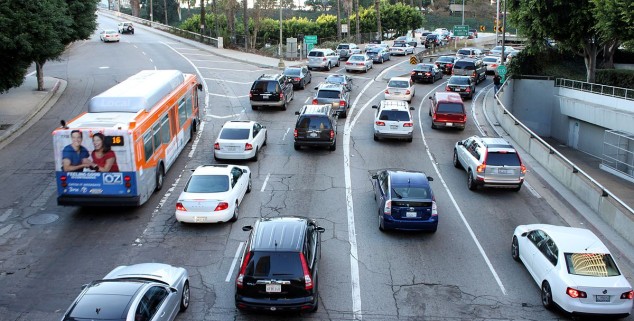Analysis
Brown’s transportation budget celebrates the car
 A traffic jam in downtown Los Angeles. (Photo: Prayitno, Wikimedia)
A traffic jam in downtown Los Angeles. (Photo: Prayitno, Wikimedia)Weeks after returning from the Paris summit on climate change where he was hailed as a leader in the movement to limit greenhouse gases, Gov. Jerry Brown has proposed a new transportation budget that celebrates the car.
In 2016-17, Brown wants to spend $16 billion on transportation, and most of that would go toward making it easier for people to drive. The Democratic governor wants to build new roads and highways and repave old ones, and use more technology to speed traffic.
The state, by law, must spend cap-and-trade money only for projects that reduce greenhouse gases.
Brown does dedicate some new money to transit and rail improvements, including the high-speed rail project that he sees as part of his legacy.
But he proposes almost nothing to promote “active transportation” – human-powered movement through neighborhoods and cities on bikes and on foot that is not only better for the environment, but also for our health.
Despite an increase of $3 billion for transportation overall, his budget would offer the same $120 million these programs received in 2015-16 to pay for changes that make streets safer and offer alternative routes to help walkers and cyclists get off the roads.
Brown’s budget would do little to reduce a backlog of more than $800 million in local projects seeking a share of these limited funds.
His biggest insult to active transportation is his proposal to use $100 million in cap-and-trade fees collected from industrial polluters to finance an initiative he calls “low-carbon roads.” That proposal might even be illegal.
Here’s why: The state, by law, must spend cap-and-trade money only for projects that reduce greenhouse gases. But while Brown says a share of the new $100 million program might go to active transportation projects, he also wants to use the money to fill potholes, repave roads and synchronize street lights so that traffic can move at a steadier pace.
Even if it were legal, the proposal is hardly climate-friendly.
The theory is that since cars and trucks in stop-and-go traffic emit more greenhouse gases, allowing them to move more quickly would reduce those emissions.
But the administration’s own research, gathered by the state Air Resources Board, disputes this idea. A paper posted on the board’s website concludes that while road improvements might, in isolation, slightly reduce greenhouse gases, they would also induce people to drive more, and the new carbon emissions would likely be greater than any reduction.
And that analysis doesn’t even address the greenhouse gases emitted by the road construction, itself. The cooking and application of asphalt pavement is a huge source of emissions.
This is not to say that making roads more efficient is a bad thing. But doing so with money that’s legally (and morally) bound for greenhouse gas reductions is a stretch at best.
Even if it were legal, the proposal is hardly climate-friendly. The $100 million Brown wants to divert would amount to no more than a rounding error in the multi-billion-dollar roads budget. But it could almost double what the state is spending to make communities more hospitable for people who can’t drive or prefer not to use a car.
A budget consistent with the lofty goals Brown promoted in Paris would give more than a pittance to active transportation, and it would require that any road improvements be designed to make alternatives to driving easier and safer, not more of a challenge than they already are.
—
Ed’s Note: Daniel Weintraub is editor of the California Health Report. He can be reached at [email protected]. This story, used by permission, originally was posted here.
Want to see more stories like this? Sign up for The Roundup, the free daily newsletter about California politics from the editors of Capitol Weekly. Stay up to date on the news you need to know.
Sign up below, then look for a confirmation email in your inbox.

Thank you Governor for recognizing what California citizens want and need. Good roads are a major economic and social infrastructure in this great state. Our existing infrastructure must be maintained.